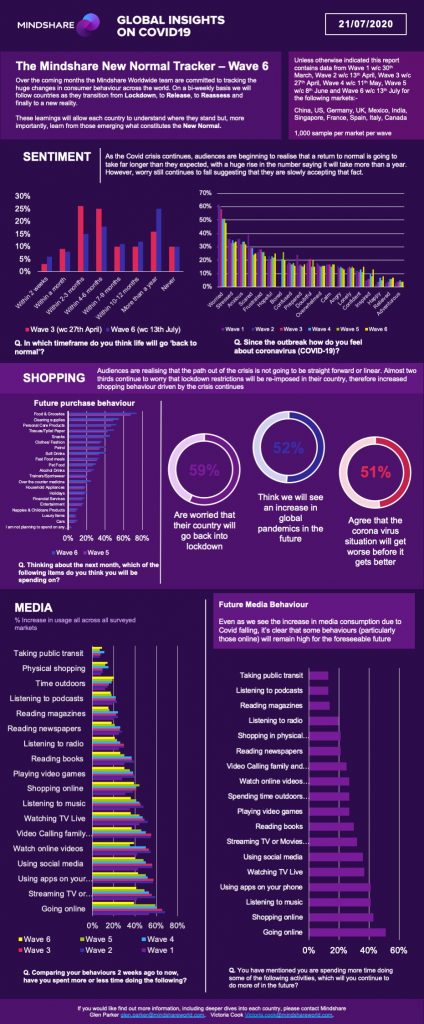22nd July 2020
Mindshare New Normal Tracker Reveals Fears of Second Lockdown and the Return to Normal Taking Longer Than Expected
Mindshare New Normal Tracker Reveals Fears of Second Lockdown and the Return to Normal Taking Longer Than Expected, Despite Levels of ‘Confidence’ and ‘Happiness’ Returning
New York, Miami, London, Singapore, Shanghai, 21st July 2020: Mindshare, the agency network that is part of WPP, has released the sixth wave of its ‘New Normal’ COVID-19 tracker - a 1,000 person per market survey across 10 global markets that tracks changes in consumer behaviour in order to identify new behaviours that may become the ‘new normal’ post COVID-19.
Wave Six data shows that levels of confidence and happiness are returning but there is still fear of a new wave and the situation becoming worse before stabilising. There are also signs that certain media consumption behaviours attained during lockdown will continue for the foreseeable future.
Wave 6 data - W/C 11th of July showed five key insights:
1. Consumers feel worried about a second lockdown and that things will get worse before they get better.
59% of consumers are worried about the return of a new lockdown, this is truer for Spain (78%), where second waves of local lockdowns are already taking place. China and US are currently the least likely to agree to this worry of new lockdown measures. Across all age groups there is a similar level of worry for the situation to reverse and for lockdown measures to return. 1 in 2 consumers globally also feel that the situation will get worse before it gets better, however those countries who are ahead of the curve (China, 24% and Italy 40%) are the least likely to agree with this statement.
2. The return to ‘normal’ may not come as soon as once thought
Back in April, consumers globally believed that it would take around 2-3 months for the world to return to normal and it was markets such as Mexico (38%) and China (36%), which were the most optimistic. Today, consumers fear it will take longer and 1 in 4 think it will take more than a year to be back to normal. Here, the optimism of the younger age groups is noticeable as 12% of 18-24’s think it will take more than a year to recover versus 22% of the over 55’s. Market wise, China is the most positive with 30% of consumers thinking it will now take 2-3 months, whereas 10% of the US think that things will never be the same again.
3. Happiness and confidence levels at their highest level since March 2020.
Despite the fact the main sentiment for consumers continues to be ‘worry’ (48%), levels of ‘happiness’ and ‘confidence’ haven risen as signs of recovery begin to emerge. In the UK the ‘happiness’ levels have increased by +2%ppt to 11% and in India it is now at 15%. As the world looks to China for hope, their levels of ‘confidence’ have also increased in the last month to its highest at 22%, from 15% a month ago. Happiness is generally felt by both women and men equally; however, it is the younger generations who are driving the increase on the happiness level across the globe. ‘Confidence’ on the other hand is felt by the older generations. Across all age groups there has also been an increase in ‘hope’ with India (32%) and China (30%) the top the markets for feeling ‘hopeful’.
4. Online shopping is a new normal
There has been an increase in online shopping since the beginning of lockdown as consumers had to fast track this behaviour and adopt it in order to get their essentials. The latest results confirm this is a behaviour that is here to stay, particularly with the older generation (65+). In March 55% of those 65+ claimed to be shopping online ‘more’ or ‘roughly the same as before’ and this has now jumped to 81%, catching up to the levels claimed by the other age groups. Despite being able to go to physical stores across most markets, only 14% of consumers are doing so and in China where lockdown was lifted back in April, over 1 in 2 consumers are still shopping online.
5. People are noticing the changes to those around them and their own impact on the environment
After living the new normal for the last 4 months, consumers are noticing changes in their own habits but also changes to those whom they are surrounded by. 6 in 10 people claimed that they have noticed the way people behave in general has changed and 57% have become more conscious of their own behaviour, particularly how their actions impact the environment. There is also is also a level of uncertainty in consumer habits, as 1 in 2 have stopped spending on things they do not need. Other behaviour changes noticed by consumers include in the UK, where 54% claim that wearing protective equipment is not something they will get accustomed to and in Mexico, where 58% of consumers have used this time period to do the things they have been putting off for a while.
For more information please contact Greg Brooks: +44(0)7826869312 | [email protected]
